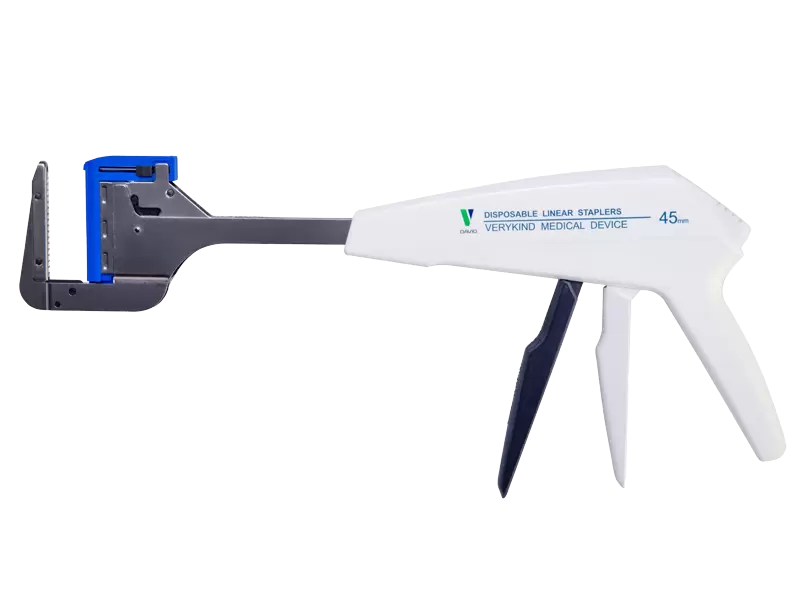In the field of modern medicine, continuous innovation and development of surgical technology are crucial to improving patients' treatment effects and recovery experience. Among them, the disposable linear stapler developed by VERYKIND MEDICAL, with its unique advantages, has significantly simplified the surgical process and greatly improved the patient's recovery experience.

Technical features and advantages of disposable linear staplers
The disposable linear stapler is an advanced instrument designed specifically for surgical procedures. Its core technology lies in its ability to quickly and accurately complete tissue cutting and anastomosis, thereby simplifying the surgical process and reducing patient pain. Compared with traditional manual suturing methods, disposable linear staplers have the following significant advantages:
1. Improve surgical efficiency: The disposable linear stapler adopts mechanized operation and can complete the cutting and anastomosis of a large number of tissues in a short time, greatly shortening the operation time and improving the operation efficiency.
2. Reduce surgical risks: The disposable linear stapler developed by VERYKIND MEDICAL uses horizontal sutures to evenly stress the tissue, which can reduce bleeding and damage during the operation, thereby reducing surgical risks and improving the success rate of the operation.
3. Promote postoperative recovery: The unique titanium alloy staples developed by VERYKIND MEDICAL have better strength and prevent anastomotic leakage, which helps patients recover quickly after surgery.
4. Reduce the risk of infection: The disposable design ensures the hygienic safety of the instrument, avoids the risk of cross-infection, and provides a safer surgical environment for patients.
Application practice of disposable linear staplers in surgery
Disposable linear staplers are widely used in a variety of surgical operations, especially playing an important role in operations on the digestive tract, blood vessels, lungs and other parts. The following will discuss the application practice of disposable linear staplers based on specific surgical cases.
1. Application in digestive tract surgery: In digestive tract surgery, disposable linear staplers can quickly complete intestinal cutting and anastomosis, reducing bleeding and damage during the operation. At the same time, the uniform anastomosis of the stapler can help reduce the occurrence of postoperative complications such as anastomotic leakage and improve the surgical effect.
2. Application in vascular surgery: In vascular surgery, disposable linear staplers can accurately cut and anastomose blood vessels to ensure the patency and stability of blood vessels. This helps reduce risks such as postoperative thrombosis and vascular stenosis, and improves patients’ survival rate and quality of life.
3. Application in lung surgery: In lung surgery, disposable linear staplers can achieve rapid and accurate cutting and anastomosis of lung tissue, helping to reduce surgical trauma and postoperative pain. At the same time, the application of staplers can also help reduce the occurrence of complications such as postoperative pulmonary infection and respiratory failure, and improve the recovery effect of patients.
Precautions for operating disposable linear staplers
Although disposable linear staplers have many advantages, you still need to pay attention to the following matters during use to ensure the safety and effectiveness of the surgery:
1. Preoperative preparation: Before using a disposable linear stapler, the doctor should fully understand the patient's condition and surgical needs, and select the appropriate stapler model and specifications. At the same time, the integrity and cleanliness of the stapler should be ensured and the use of expired or damaged instruments should be avoided.
2. Operating specifications: Doctors should follow operating specifications when using the stapler to ensure the accuracy and stability of cutting and anastomosis. During the operation, attention should be paid to the control of the degree and angle to avoid unnecessary damage to surrounding tissues.
3. Postoperative observation: After surgery, doctors should closely observe the patient's recovery, especially the condition of the anastomosis. If abnormalities are discovered, timely measures should be taken to ensure the safety and recovery of the patient.
Future development trends of disposable linear staplers
With the continuous advancement and innovation of medical technology, disposable linear staplers will show the following development trends in the future:
1. Intelligent development: Future staplers will be more intelligent and can automatically adjust cutting and stapling strength according to surgical needs, improving the accuracy and safety of surgery.
2. Material innovation: The manufacturing materials of staplers will continue to be innovated to improve the durability and biocompatibility of the device and reduce postoperative discomfort and complications for patients.
3. Personalized design: For different parts and surgical needs, the stapler will achieve a more personalized design to meet the treatment needs of different patients.
Conclusion
As an innovative medical device, disposable linear staplers play an important role in simplifying surgical procedures, improving surgical efficiency, reducing surgical risks, and promoting patient recovery. With the continuous advancement and innovation of medical technology, the disposable linear staplers developed by VERYKIND MEDICAL will achieve more intelligent, personalized and safe development in the future, contributing more to the health and well-being of patients. At the same time, we should also pay attention to the usage specifications and precautions of staplers to ensure their safe and effective application in the medical field.
Verykind
wxam.assistant@marketingforce.com
